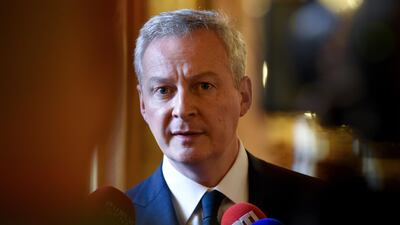Corporate tax dodgers and big tech companies will be the focus of a new crackdown when France takes the presidency of the G7 group of countries.
Bruno Le Maire, France's minister of economy and finance, said his country cannot justify taxing SMEs while allowing internet giants to contribute almost nothing to the country's coffers.
The minister also acknowledged the yellow vest protests and a 'social crisis' that have paralysed France in recent months.
But he said Emmanuel Macron would continue to make major reforms to make his country more competitive.
In a key speech on the first morning of the World Government Summit in Dubai, he said:
- Capitalism must change to prevent greater inequality and division in society
- OECD countries must work together to bring in a minimum corporate tax
- The rise of far right parties in Europe can only be tackled by narrowing the gap between the rich and poor and addressing social problems
- France will soon sell off Groupe ADP, the national airport operator; energy firm Engie and La Française des Jeux, the state-run lottery company, to secure about 10 billion euros to plough into SMEs.
Le Maire said the Macron government understood the impact of major reform on France's traditionally socialist economy.
"Even if we are facing, as you all know, a social crisis in France, we remain fully determined to move forward," he said.
He took aim at internet giants like Facebook, Google and Amazon - without naming them - and said all developed nations must close loopholes that allow them to pay very little tax. In the UK, for example, Facebook paid just 15.8 pounds (Dh75 million) or about 1 per cent of the sales it made.
France introduced its own tax on technology firms on January 1 after failing to convince EU partners of the need for a bloc-wide law. It was opposed by Ireland - home to Google's Europe offices - along with Czech Republic, Sweden and Finland. He has previously said the new digital tax should raise about 500 million euros.
This year Spain, Italy, UK, and Austria will all introduce similar measures, he said, pointing to the need for multilateral action.
"People accept to pay taxes when they see how they are being used and when they feel they are being taxed fairly," he said.
"If some pay and others don't, it obviously leads to a deep sense of injustice and injustice is always at the core of negative and violent reactions.
"This is a massive problem today, look at the reality.
"As the French finance minister I can no longer explain to the french SMEs that they will have to pay 40 points more tax than the internet giants because we are not able to tax data and tax internet activities."
He also said there are "far too many havens and jurisdictions with very low tax rates".
"Tax evasion and aggressive tax avoidance are still very much in the picture," he said.
Mr Le Maire said his government is calling on all OECD countries to work together on a 'minimum corporate tax' - so that companies like Facebook cannot be based in one low-tax country and do business across the globe without paying tax.
He went on to describe a crisis in capitalism, which he said had driven great growth in the past, but led to the kind of division and the rise of the far right.
"Let's open our eyes. Capitalism is no longer delivering on its promises," he said.
"Many people, in all countries, in all European nations, feel left behind, feel left out of globalisation and of the benefits."
And in a veiled swipe at the protectionist policies of US President Donald Trump - who has espoused the America first doctrine and sparked a trade war with China - Mr Le Maire said 2019 was not the year for nations to retreat and put up barriers.
"This solution will lead nowhere but to more poverty, more crisis, and more tensions among nations," he said.
The cabinet minister thanked his Emirati hosts for creating the government summit and remarked on the vast economic growth seen in the past 40 years.
"The development of your country is incredible... I strongly believe the UAE will play an increasing role in the 21st century and I'm looking forward to that."



